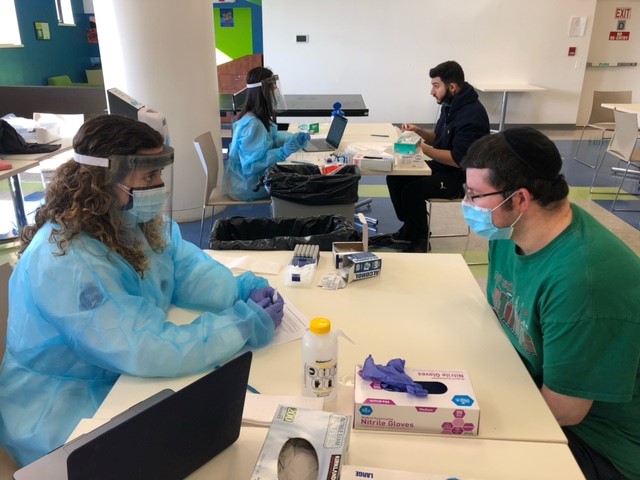Staying Safe
Touro Leads with its Strengths: Proactive COVID-19 Surveillance Monitoring Helps Keep Infection Rates "Remarkably Low"

Touro College and University System (TCUS) has begun a mandatory proactive screening program of surveillance testing at its New York schools to help ensure that its campus communities are, and remain, COVID-19-free.
The “Proactive Surveillance Testing for COVID-19 of Asymptomatic Individuals” effort began in September 2020. Anyone who traveled over the holiday to a state non-contiguous with New York must show negative results before returning to campus and can be tested this week to make sure they can return.
The screening is being conducted by Touro College of Pharmacy (TCOP) faculty and administration, who are visiting approximately a dozen school sites to administer the tests. As of November 17, 2020, more than 1,300 asymptomatic students and employees were screened using saliva samples or nasal swabs, with a remarkably low rate of positivity, 0.63 percent.
A Farsighted Approach
“In September many colleges and universities were debating as to the value of campus surveillance testing, but we decided to take the initiative,” said Rabbi Moshe Krupka, TCUS executive vice president and university ombudsman. “We realized the more often we would test, the more knowledgeable we would become about infection on campus, hence the more prepared we will be to mitigate spikes by catching asymptomatic positive cases early on.”
According to a report published in October by National Public Radio that analyzed data from more than 1,400 colleges, most colleges with in-person classes this fall either had no clear testing plan or were testing mainly symptomatic students or those who had contact with someone who tested positive.
The need for surveillance testing was recently underscored by a study published in a Centers for Disease Control (CDC) Report vetting the testing of asymptomatic individuals in university settings. The practice is becoming more common in higher education in New York to keep infection rates down and avoid closure under state regulations. Monitoring, coupled with standard safety precautions like masks, hand washing and physical distancing, is endorsed to maintain safe and secure environments for all.
Meeting with the President
Touro’s program was launched after a meeting on September 9, 2020 between TCUS President Alan Kadish, M.D., and Salomon Amar, D.D.S., Ph.D., provost for biomedical research at TCUS and vice president for research at New York Medical College. Dr. Amar is the architect of Touro’s surveillance program evaluating the level of COVID-19 positive cases by geographic region using a saliva sample technique. The goal of the program is to periodically test about a quarter of everyone coming to any of the Touro New York campuses.
“This is a milestone for Touro in preventing and managing COVID-19 among our students and employees,” said Dr. Amar. “From a surveillance perspective, this program offers an assessment at a given time of the level of infection in a community. We don’t test everyone but after multiple continuous testing, we will have covered the whole community.”
Surveillance monitoring involves periodic mandatory screening for SARS-CoV-2, the virus that causes COVID-19. As Thanksgiving break approached, 1,342 samples had been collected—900 from saliva and 442 from nasal swabs. Saliva samples are sent to labs for molecular PCR testing, which detects genetic material from the virus in 12-18 hours; rapid tests are processed with nasal swabs, with results available within minutes, yet suffer significant false positives.
Those using saliva tests draw samples using sterilized straws and tubes, and specimens are then pooled into groups of 24 and analyzed together. In the rare cases where pooled results indicate infection, everyone in the pool takes diagnostic tests with nasal swabs off-campus, and self-quarantines until cleared to return. Results are reported to government and regulatory agencies, which begin contact tracing.
Using Our Resources: Touro College of Pharmacy
TCOP’s testing team is led by Henry Cohen, PharmD, M.S., dean of TCOP, and Michael Liu, PharmD, BCCP, BCNSP, assistant dean and associate professor of pharmacy practice, with five pharmacist faculty members.
“Leveraging our own strengths makes it easier than calling in a pharmacist or sending people to an urgent care facility. We can test safely and appropriately and at lower cost,” said Dean Cohen. “Tests are free for our community, no one has to wait long, and we bring the tests to you. It doesn’t get more convenient.”
Through October, COVID-19 testing was done using saliva samples; recently rapid tests were made available to Touro and now both tests are used, but there are advantages and drawbacks to each test. “Rapid nasal swab tests may be useful,” said Dean Cohen, “especially in the ‘hot spot’ areas [red and yellow zones] because it’s faster and also you get immediate results. If you are COVID-19 positive you can see your physician within the next day.” Saliva tests hold an advantage, Dr. Amar said, in that they can be used for both surveillance of a large community and for the more acccurate PCR diagnostic testing of individuals.
Now that Thanksgiving has passed, Dr. Amar and the TCOP pharmacists are preparing for “round two” and to continuing to keep Touro’s campuses safe.
/prod01/channel_38/media/redesign/assets/images/background-images/locations-background.jpg)
